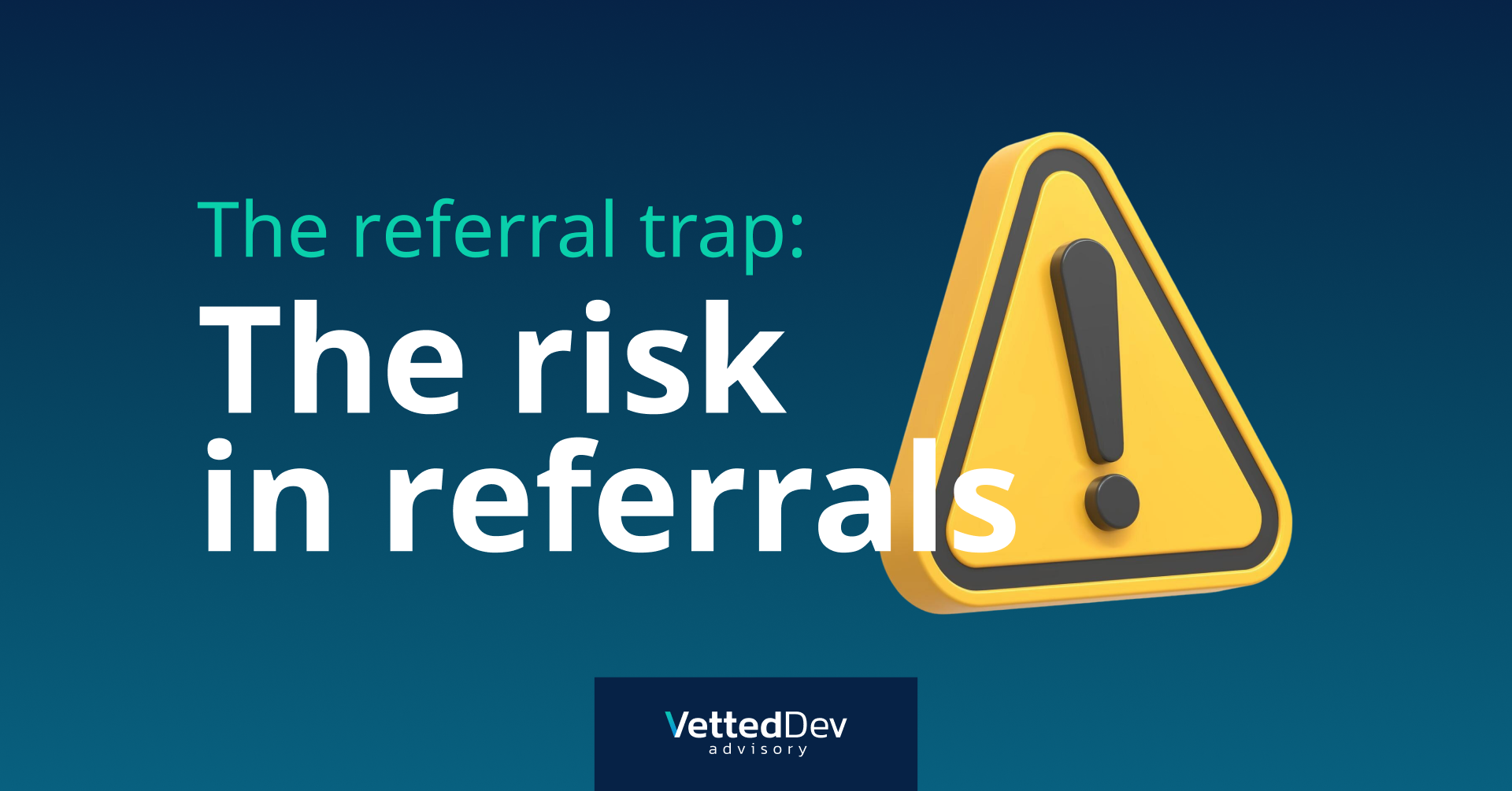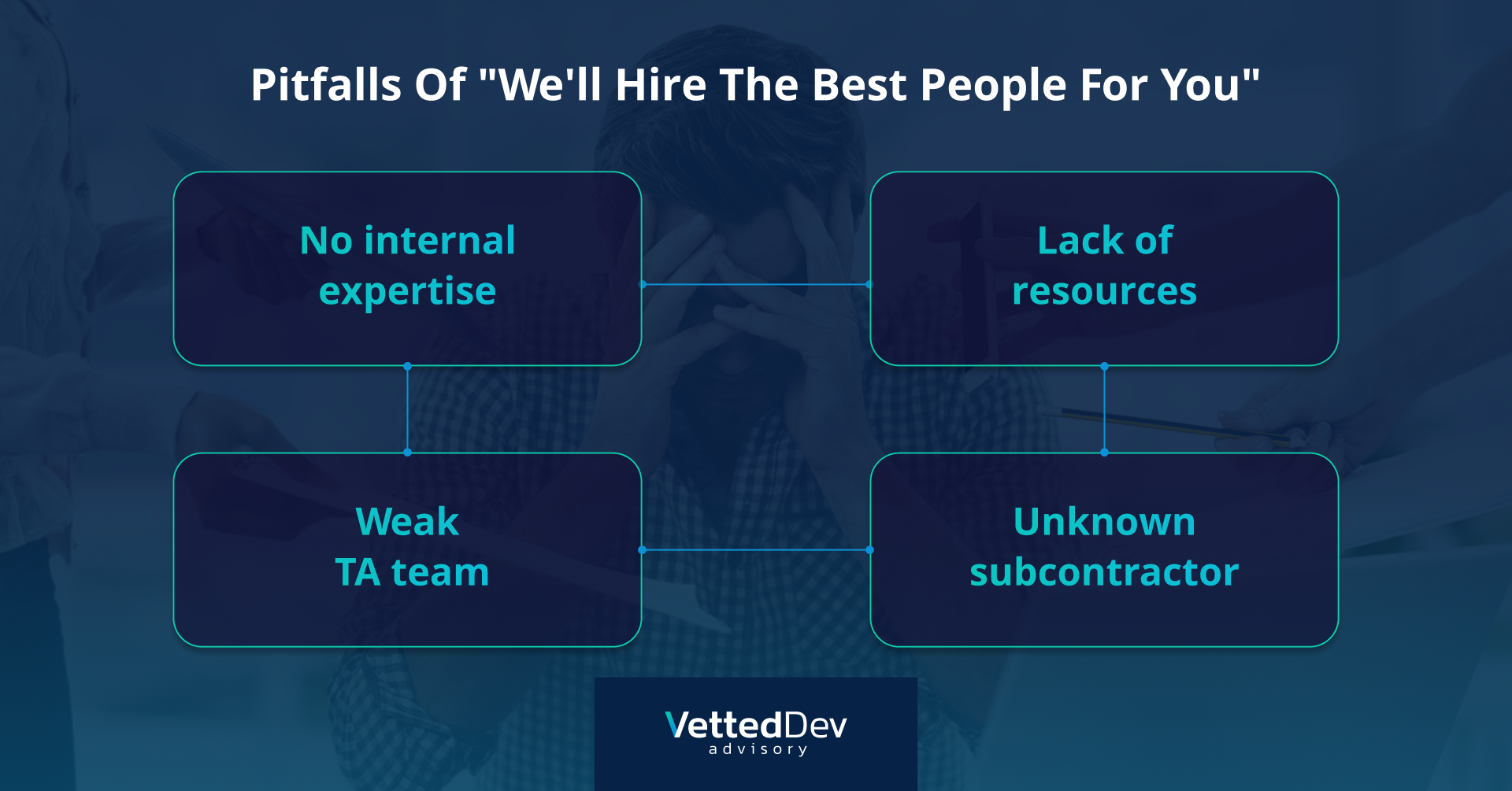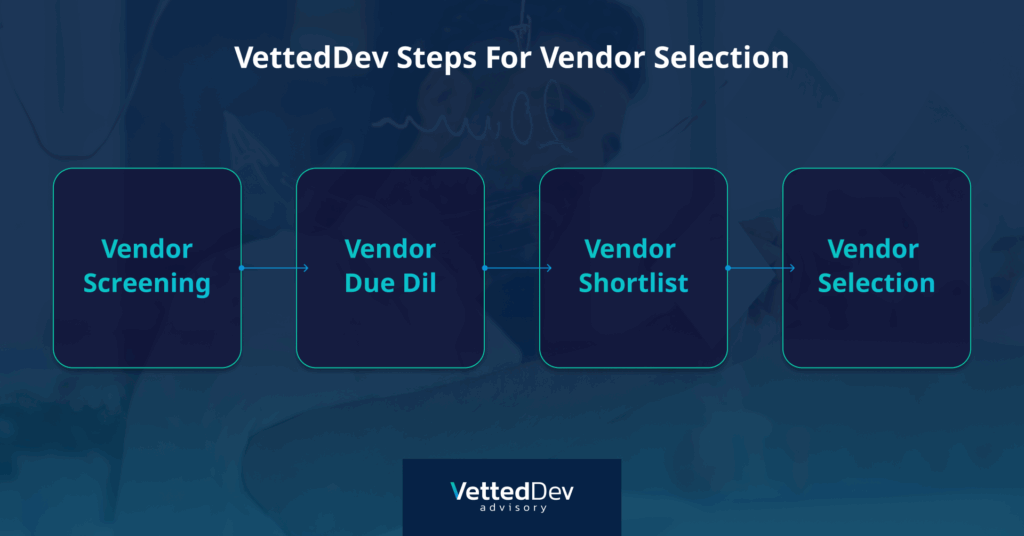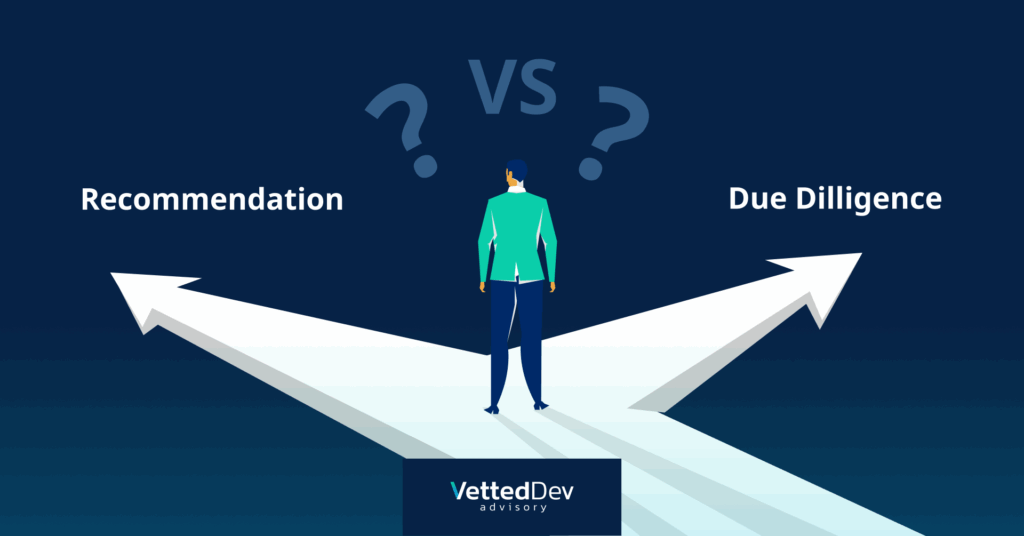Word of Mouth for Vendor Selection – That Works, But …
By VettedDev.net
When it comes to building software, one of the biggest and most expensive decisions any founder or business leader will make is choosing who builds it.
It’s tempting, even comforting, to rely on someone you trust. A friend from university. A former colleague. Someone who just closed a round for their healthcare startup and is thrilled with their development team. They introduce you to their vendor. They say, “These guys are great.” And that’s it you’re in touch, you get a warm email intro, a call, maybe a ballpark quote. Feels like a shortcut. A win.
But here’s the truth: choosing a software development vendor solely on word of mouth or personal referral is one of the riskiest moves you can make, especially if you’re building something outside their wheelhouse.
We see it all the time at VettedDev. And we’ve been on both sides of the table: selling and buying, building and launching, hiring and scaling. That experience has taught us a simple truth: good intentions and a good track record in someone else’s domain do not automatically translate into success for your unique project.
Let’s explore why.

The “Trusted Referral Trap”
Imagine this. You’re building a fintech product, say, a B2B payment platform with open banking integrations, real-time fraud prevention, and rigorous PCI DSS compliance.
You reach out to your friend’s recommended vendor. They built a SaaS platform for a healthcare startup. Delivered on time. Solid work. Nice people. You connect, and you get the standard response:
“Send us your full requirements, and we’ll provide an estimate.”
On the surface, that seems reasonable. But here’s the catch: do they understand your domain?
If they’ve never touched fintech, how are they supposed to meaningfully engage with your product vision? Can they challenge your assumptions? Help you avoid regulatory pitfalls? Design for trust and compliance from day one?
Often, the answer is no.
So they default to the one-size-fits-all playbook: “Let’s build an MVP.”
Not because it’s the right strategy but because it’s all they know. They’re hoping to learn fintech on your dime. And that MVP? It may end up being a costly throwaway, riddled with architectural and security flaws that are obvious to anyone with real fintech experience.
The result? You burn through the budget, delay launch, and maybe lose investor confidence.
Risk #1: Wrong Domain, Wrong Assumptions
Referrals rarely come with a fine print. Your friend is happy with their vendor but for a very different kind of product.
Your project might be in fintech, logistics, proptech, mobility, gaming, or something deep in enterprise automation. The risk is that you’re assuming their success in one domain will carry over to yours.
But software development isn’t generic. It’s not just about writing code it’s about writing the right code, with the right architectural patterns, compliance frameworks, and domain logic.
For example:
- In fintech, do they understand PSD2, PCI DSS, KYC, AML, and open banking protocols?
- In healthcare, do they grasp HIPAA, HL7, and FHIR?
- In logistics, have they worked with real-time tracking, last-mile optimization, and dynamic routing?
If they haven’t, you’re taking a gamble. And no number of personal referrals can de-risk that.

Risk #2: The “MVP First” Excuse
MVPs are often the go-to response from under qualified vendors.
Now, don’t get us wrong—building an MVP is often smart. You want to test hypotheses, validate market fit, and get feedback fast. But when the MVP is pitched not as a strategic move but as a way to delay understanding the domain – that’s a red flag.
Some vendors will start building with vague specs just to get the engagement going. They assume that you’ll iterate into clarity. That might work in hobby apps, but in regulated industries, you can’t MVP your way out of compliance debt.
If the MVP isn’t built with domain constraints in mind, you’ll have to scrap most of it. That means you’ll pay not just for the rebuild, but for all the avoidable mistakes along the way.
Risk #3: “We’ll Find People After You Say Yes”
This one is insidious.
Let’s say you need five senior engineers. You get a glowing referral to a boutique dev shop. You talk to the founder. Smart person. Great intent. You ask: “Do you have the people for this tech stack?”
Their answer: “We’ll hire the best people just for you.”
Sounds great… until you realize:
- They have no internal expertise in your tech stack.
- Their TA (talent acquisition) team is small, maybe even one person.
- They don’t have the resources to properly vet candidates technically.
- They might even subcontract your project to another firm behind the scenes.
Suddenly, you’re not hiring them, you’re hiring whoever they can scramble together in a few weeks. That’s a hiring roulette, not a vendor selection process.
Even worse, you may end up being managed by a company with no actual visibility or control over the engineers writing your code.

Risk #4: The Subcontracting Black Hole
Subcontracting is rampant in the outsourcing world. Many agencies accept work, then go out to market to fill roles, sometimes through multiple layers of subcontractors.
You lose visibility. You lose accountability. You lose time.
- Who’s really writing your code?
- Who owns delivery responsibility?
- What happens when things go sideways?
If the original vendor is just a middleman, it’s almost impossible to manage quality or timelines. Escalations take longer. Context gets lost. Bugs multiply.
Worse still: you could be paying a premium while your actual developers earn a fraction of the rate, reducing incentives for top talent.
Risk #5: You’re on Your Own for Due Diligence
Let’s be honest—most founders don’t have time for exhaustive due diligence.
When you go solo, here’s what you should be doing:
- Reviewing financial stability and cash flow of the vendor.
- Asking for multiple references, not just cherry-picked ones.
- Digging for unhappy former clients, not just case studies.
- Evaluating their delivery process, do they have a DMO (Delivery Management Office) or PMO (Project Management Office)?
- Reading every public review and reverse-engineering results.
- Checking hiring practices, tech stack alignment, and internal team health.
- Auditing previous codebases and architectural patterns.
- Verifying if they outsource your outsourcing.
Most people don’t do all of this. And it’s not because they’re lazy it’s because it’s hard and opaque. That’s where bad matches happen.
Why We Built VettedDev
At VettedDev, we exist because of all this mess.
We don’t do development. We’re not another dev shop or agency. We’re independent consultants who sit on the client’s side of the table helping you find the right development partner, the first time.
We specialize in understanding:
- Your domain and technical goals.
- The specific risks you face (regulatory, product-market fit, funding, scale).
- What kind of vendor structure will actually serve you (team size, geography, stack alignment, etc.).
Then, we go out and do the dirty work:
- We vet vendors across key outsource locations.
- We run deep due diligence on capabilities, financials, team composition, hiring pipeline, and delivery quality.
- We connect you with vendors who are already experienced in your domain.
- We act as a buffer between you and sales pressure—so you can make decisions clearly.
Think of us as your vendor matchmaking and due diligence team, all in one. No guessing. No guessing. No gambling. Just the right fit.

What You Should Ask Before Signing a Vendor
Even if you don’t use VettedDev, here’s a short checklist we’d recommend:
- Have you done projects in my domain before? Can I talk to those clients?
- Who exactly will be on my team? When will they start?
- Do you subcontract any of your work? Can I meet the developers?
- How do you handle compliance and regulatory issues in my industry?
- What’s your process for scoping unknowns? Do you consult or just code?
- Do you have delivery oversight—Scrum masters, QA leads, tech architects?
- What happens if the project is delayed or we’re unhappy?
If you don’t get confident answers or get vague responses like “we’ll figure it out” – that’s a red flag.
Word of Mouth is a Starting Point – Not a Strategy
Referrals are great. They create trust. They give you a reason to talk.
But don’t confuse a recommendation with a due diligence process.
What works for your friend may not work for you. Different products. Different domains. Different expectations. Different risks.
You wouldn’t hire your friend’s lawyer to handle your tax investigation just because they helped in a divorce.
The same principle applies to software vendors.

You’re building something valuable. Don’t trust its foundation to casual intros and warm feelings.
We help founders and companies like yours find domain-aligned, trustworthy, and vetted development partners—without falling into the usual traps.
For more insights on finding the right outsourcing partner? Visit VettedDev.net for guides, tips, and curated recommendations.
